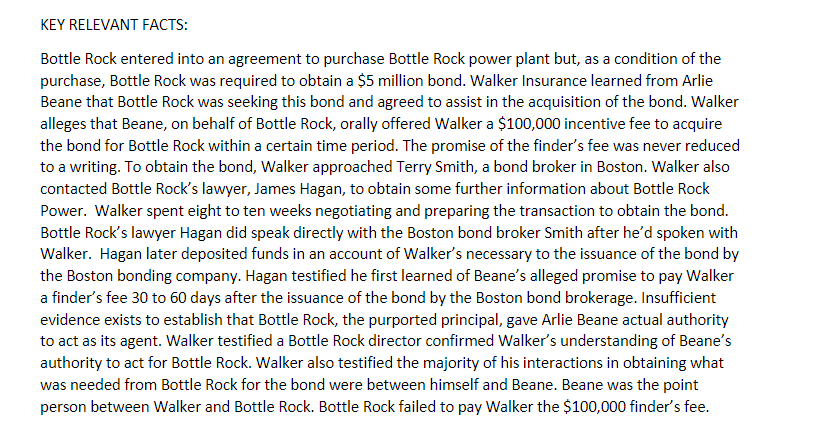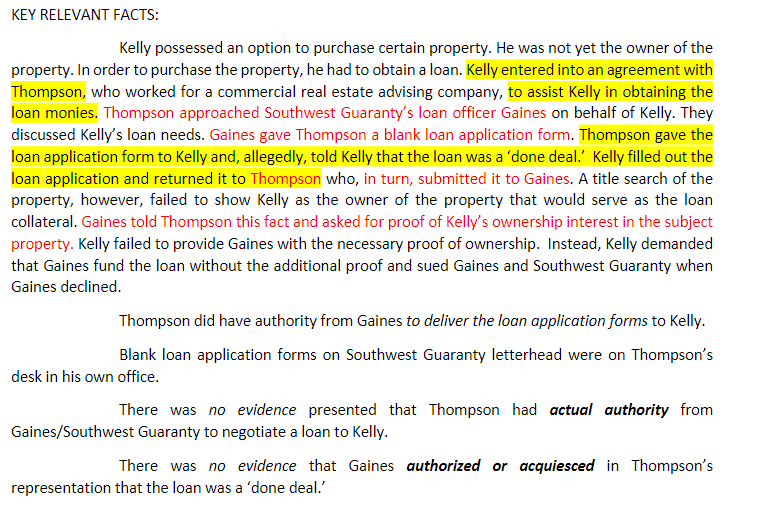How are the facts in Walker distinguishable from the facts of Gaines v Kelly?
KEY RELEVANT FACTS: Bottle Rock entered into an agreement to purchase Bottle Flock power plant but, as a condition of the purchase, Bottle Rock was required to obtain a $5 million bond. Walker Insurance learned from Arlie Beane that Bottle Rock was seeking this bond and agreed to assist in the acquisition ofthe bond. Walker alleges that Beane, on behalf of Bottle Rock, orally offered Walker a $100,000 incentive fee to acquire the bond for Bottle Rock within a certain time period. The promise ofthe nder's fee was never reduced to a writing. To obtain the bond, Walker approached Terry Smith, a bond broker in Boston. Walker also contacted Bottle Rock's lawyer, James Hagan, to obtain some further information about Bottle Rock Power. Walker spent eight to ten weeks negotiating and preparing the transaction to obtain the bond. Bottle Rock's lawyer Hagan did speak directly with the Boston bond broker Smith after he'd spoken with Walker. Hagan later deposited funds in an account of Walker's necessary to the issuance ofthe bond by the Boston bonding company. Hagan testified he first learned of Beane's alleged promise to pay Walker a finder's fee 30 to 50 days after the issuance ofthe bond by the Boston bond brokerage. Insufficient evidence exists to establish that Bottle Rock, the purported principal, gave Arlie Beane actual authority to act as its agent. Walker testified a Bottle Rock director confirmed Walker's understanding of Beane's authority to act for Bottle Rock. Walker also testied the majority of his interactions in obtaining what was needed from Bottle Rock for the bond were between himself and Beane. Beane was the point person between Walker and Bottle Rock. Bottle Bock failed to pay Walker the $100,000 finder's fee. KE'iIr RELEVANT FACTS: Kelly possessed an option to purchase certain property. He was not yet the owner of the property. In order to purchase the property, he had to obtain a loan. Kelly entered into an agreement with Thompson, who worked for a commercial real estate advising company, to assist Kelly in obtaining the loan monies. Thompson approached Southwest Guaranty's loan ofcer Gaines on behalf of Kelly. They discussed Kelly's loan needs. Gaines gave Thompson a blank loan application form. Thompson gave the loan application form to Kelly and, allegedly, told Kelly that the loan was a 'done deal.' Kelly filled out the loan application and returned it to Thompson who, in turn, submitted it to Gaines. A title search of the property, however, failed to show Kelly as the owner of the property that would serve as the loan collateral. Gaines told Thompson this fact and asked for proof of Kelly's ownership interest in the subject property. Kelly failed to provide Gaines with the necessary proof of ownership. Instead, Kelly demanded that Gaines fund the loan without the additional proof and sued Gaines and Southwest Guaranty when Gaines declined. Thompson did have authority from Gaines to deiiver the ioan appiication forms to Kelly. Blank loan application forms on Southwest Guaranty letterhead were on Thompson's desk in his own office. There was no evidence presented that Thompson had actuai authority from GainesfSouthwest Guaranty to negotiate a loan to Kelly. There was no evidence that Gaines authorized or acquiesced in Thompson's representation that the loan was a \"done deal








